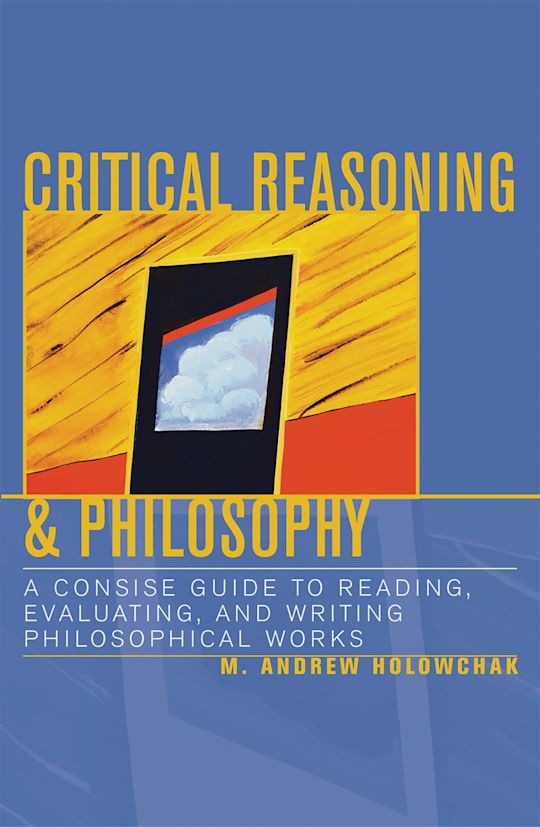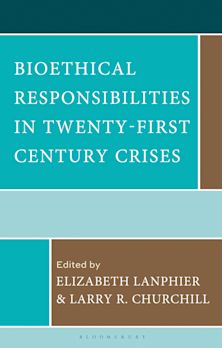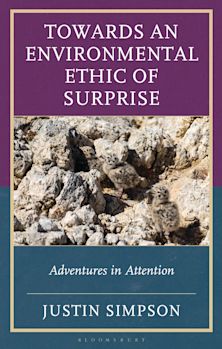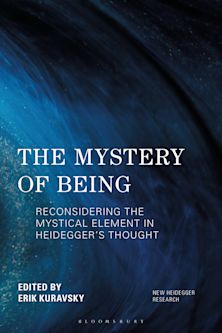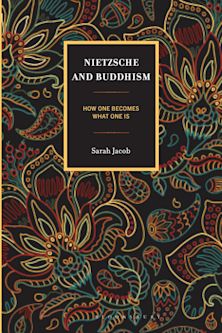- Home
- ACADEMIC
- Philosophy
- Philosophy - Other
- Critical Reasoning & Philosophy
Critical Reasoning & Philosophy
A Concise Guide to Reading, Evaluating, and Writing Philosophical Works
- Textbook
Critical Reasoning & Philosophy
A Concise Guide to Reading, Evaluating, and Writing Philosophical Works
- Textbook
For information on how we process your data, read our Privacy Policy
Thank you. We will email you when this book is available to order
Buy from Bloomsbury eTextBooks
You are now leaving the Bloomsbury Publishing website. Your eBook purchase will be with our partner https://www.vitalsource.com.
Your credit card statement will show this purchase originating from VitalSource Technologies. They will also provide any technical assistance you might require.
You must sign in to add this item to your wishlist. Please sign in or create an account
Description
Critical Reasoning & Philosophy is an innovative and clearly written handbook that teaches new philosophy students how to think and read critically, and write thoughtful, sound arguments in response. Concise, accessible language and ample use of examples and study modules help students gain the basic knowledge necessary to succeed in undergraduate philosophy courses, and to apply that knowledge to achieve success in other disciplines as well. Used either alongside primary source material or as a supplement to a primary text in critical thinking or informal logic, Critical Reasoning & Philosophy is an excellent resource for undergraduate students.
Table of Contents
Part 3 Section One: Introductory Issues
Chapter 4 Module 1:What Is Philosophy?
Chapter 5 Module 2: Philosophy and Critical Reasoning
Chapter 6 Module 3: On Reading Philosophy
Part 7 Section Two: Argument Recognition & Reconstruction
Chapter 8 Module 4: The Elements of Analysis
Chapter 9 Module 5: Ten Helpful Steps
Part 10 Section Three: Diagramming Arguments
Chapter 11 Module 6: Fundamentals of Diagramming
Chapter 12 Module 7: Ten Diagrammatical Tips
Part 13 Section Four: Argument Evaluation
Chapter 14 Module 8: A Closer Look at Statements
Chapter 15 Module 9: Conditions of Acceptance and Rejection
Chapter 16 Module 10: Three Common Deductive Arguments
Chapter 17 Module 11: Common Inductive Arguments
Chapter 18 Module 12: Other Common Fallacies
Part 19 Section Five: General Writing Tips
Chapter 20 Module 13: Getting Ready to Write
Chapter 21 Module 14: Writing Your Thesis
Chapter 22 Module 15: General Writing Tips
Chapter 23 Module 16: Common Mistakes
Part 24 Section Six: Writing Philosophical Essays
Chapter 25 Module 17: Evaluative Essays
Chapter 26 Module 18: Critical Essays
Chapter 27 Module 19: Revising and Rewriting Essays
Part 28 Appendixes
Chapter 29 Appendix A: Exercises for Diagramming
Chapter 30 Appendix B: Evaluative Essay and Outline
Chapter 31 Appendix C: Critical Essayand Outline
Chapter 32 Appendix D: Student/Teacher Comment Sheet
Chapter 33 Appendix E: Plan-for-Revision Sheet
Part 34 Bibliography
Part 35 Index
Product details
| Published | 23 Dec 2003 |
|---|---|
| Format | Ebook (Epub & Mobi) |
| Edition | 1st |
| Extent | 170 |
| ISBN | 9780742575752 |
| Imprint | Rowman & Littlefield Publishers |
| Publisher | Bloomsbury Publishing |
About the contributors
Reviews
-
Mark Holowchak has written an excellent guide for critical reading, writing, and analysis. It shows how engagement with philosophical texts exercises and improves one's ability to engage diverse issues arising in our increasingly complex lives.
Albert Mosley, professor of philosophy, Smith College
-
This is a clear and concise guide to critical reasoning. The book will be especially helpful to students who lack experience writing papers in philosophy courses since it contains sections on how to organize papers, how to avoid common mistakes in writing, and how to present arguments. It can be used either as a supplement in general introductory philosophy courses or as a more basic text in specialized courses in critical reasoning.
Robert Simon, professor of philosophy, Hamilton College
-
Critical Reasoning & Philosophy is a useful guide to the skills component of undergraduate philosophy courses, and an important resource for those of us who build courses around primary texts or contemporary issues. Holowchak spells out essential techniques for critical thinking, reading, and writing in an upbeat style that is easy to follow. Helpful hints for academic reading and writing complement traditional lessons in logic and grammar, all presented in clear, every-day language.
Heather L. Reid, Professor and Chair, Department of Philosophy, Morningside College
-
Holowchak has put together a valuable resource for those of us who teach introductory courses in philosophy. This book provides students with a ready reference outside of class when they most need it in writing their papers, and the structure of the book makes it easy to use for both students and instructors.
Jan Boxill, lecturer and associate chair, director of undergraduate studies, Department of Philosophy, University of North Carolina
-
This is an extraordinary book. In less than 150 pages, it covers topics ranging from reading to writing, grammar to logic, and understanding to evaluation. The degree of comprehensiveness, clarity, and accuracy to which each topic is treated goes far beyond that of many books of double or triple its size.
Yong Huang, associate professor of philosophy, Kutztown University
-
This clearly written manual aims to teach students in introductory courses some fundamental critical reasoning techniques for reading and writing philosophic materials. Though written for budding philosophers, this book will also benefit those undergraduates who want to write concise, tightly argued papers. Recommended.
Choice Reviews









